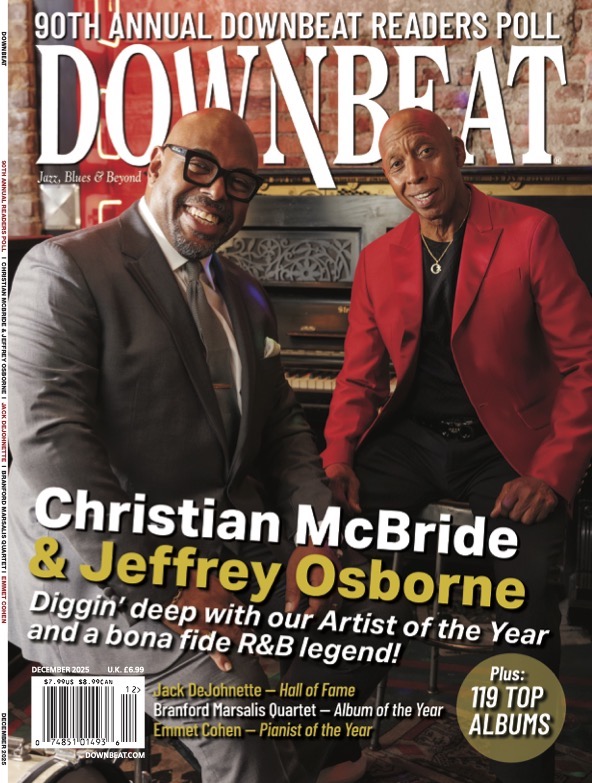By Ed Enright
Tenor saxophonist JD Allen had only one goal in mind—to play “pretty”—when he set out to record an album consisting entirely of ballads. He put the brainier aspects of his craft to the side and opted to feed his emotional core, focusing on melody and tone while making a personal expression of empathy for the human race. Allen also took off his composer hat for this project: He draws from a repertoire of classic siren songs (including “Stranger In Paradise,” “Until The Real Thing Comes Along,” “Why Was I Born,” “Come All Ye Fair And Tender Ladies,” “Put On A Happy Face,” “Gone With The Wind” and others) in a nine-track program that’s presented as a love letter to the listener.
Allen’s long-running trio with bassist Gregg August and drummer Rudy Royston becomes a quartet with the addition of guitarist Liberty Ellman, who adds essential colors and textures. Allen indulges the lower range of his horn in particular on Love Stone, tapping the meaty resonance of his instrument’s bottom notes and subtoning with old-school breathiness. He doesn’t just play “pretty,” but deliberately as well, adding a strong sense of conviction to his message. And throughout Love Stone, he succeeds in getting directly to the heart of the matter. Allen has come a long way since making a strong initial impression when he emerged on the New York scene during the 1990s; Love Stone makes it clear that he now is fully possessed of his own singular voice.
By Dave Cantor
The time trumpeter John Bailey spent performing in bands helmed by pianist Arturo O’Farrill and percussionist Ray Barretto only sparingly come to bear on this set of 9 tunes, which includes renditions of Milton Nascimento’s “Morro Velho” and Gilberto Gil’s “Ensaio Geral.”
Bailey, here performing in a quintet, replete with guitar, marks his first album as a leader after decades as a sideman with bop’s buoyancy on quickstep compositions like “Triplicity,” “Blues For Ella” and “Stepping Up,” that last tune coming off as a work that would have been well-suited to a player like Clifford Brown. It also provides ample space for saxophonist Stacy Dillard to reel off a sizable solo, before guitarist John Hart gets in a few quick bars.
Just three tunes on In Real Time slow the tempo—two being that pair of aforementioned covers—giving Bailey time to emote in a less frenzied context. It’s the anomalous “Lovely Planet,” which opens with a hefty bass feature from Cameron Brown, that exemplifies the capaciousness of Bailey’s work. The five-minute tune, which doesn’t turn toward ensemble play until almost halfway through, seems to find the band mournfully considering what’s in store for Earth—or at least wondering what folks walking around every day might be thinking and feeling.
While each of Bailey’s compositions on In Real Time provide a setting for the bandleader’s performative agility, it’ll likely leave listeners desirous of a follow-up, where he might offer some additional stylistic diversity.
By Dave Cantor
The rigorous pursuit of musical virtue can lead to any number of places within jazz’s ever-expanding borders. And keyboardist Jamie Saft embodies that notion, refusing to turn out a succession of recordings that might be thought to placate a single, certain type of listener.
If you want to hear an organ trio render dub in the 21st century, listen to Bad Brains frontman H.R. let loose over top of that same group or take in Cyro Baptista’s squiggling percussion across the troupe’s Jamaican-derived simplicity, Saft’s New Zion Trio is there to help. Need a stunningly beautiful and evocative set of acoustic solo piano? Saft recently issued Solo A Genova (RareNoise). Maybe a bit of jazz-rock stuff? He can do that, too.
What his quartet does consistently on Blue Dream, though, is swing while displaying an all-encompassing capacity for mood and dexterous interplay. Here, Saft’s troupe—saxophonist Bill McHenry, bassist Bradley Jones and drummer Nasheet Waits—turn in 12 rangy tunes, meandering from the spiritual side of things on “Vessels” and “Equanimity” to classic jazz on “Violets For Your Furs” and on to some baroque jazz pieces, as on “Walls.”
With the release of such a strong recording just months after that intimate solo disc, the only thing listeners should be wondering is just how many more near-perfect statements of purpose are comming from Saft in 2018?
By Frank Alkyer
Kavuma is the kick-ass debut album by Uganda-born, British-raised trumpeter Mark Kavuma. If you’re a fan of the hard-bop tradition, and want to hear how this indelible musical movement has been infused with the energy of a new generation of creators from across the pond, you’ve got to check this out.
Let’s start with Kavuma himself. He’s a 23-year-old trumpeter and an up-and-coming voice on the new British jazz scene. That said, he has been on the radar here in the States for some time now. He was named the best soloist at the Essentially Ellington High School Jazz Band Competition and Festival back in 2012, which led to a guest soloist spot with Wynton Marsalis and the Jazz at Lincoln Center Orchestra. Since then, he’s continued to work on his craft. He leads his own quartet. He plays in the house band for the Floor Rippers’ Element Jam, a recurring showcase in London that merges jazz with hip-hop and dance. And he leads Kavuma & The Banger Factory. With his debut, Kavuma surrounds himself with many of the musicians from these worlds. Take, for example, drummer Kyle Poole. The set opens with Poole driving a 70-second drum solo before the rest of the band kicks in. He’s all over this album in a featured role—and, somewhere, Art Blakey is smiling.
But the entire cast here is sensational. Mussinghi Brian Edwards and Ruben Fox kill it on saxophones; Artie Zaitz is a guitarist with a remarkable sound and technique; Reuben James is a sensational pianist; and Conor Chaplin is a bassist full of style and attitude. Kavuma is a terrific trumpeter, and an even better ringleader. He certainly knows how to craft a great program of music. The originals are awesome, and so are the covers. “Carolina Moon,” a tune he heard Thelonious Monk play, is a fantastic throwback, featuring James’ awesome honky-tonk piano. “Barbar G” is an achingly beautiful ballad. And “Church,” which features guest artist Michela Marino Lerman in a tap-dancing role, just tears it up. Throughout the recording, you’ll hear players whooping, howling and cheering on great solos. They’re having a great time, and so will the listener. This is one of the best debuts I’ve heard in a long, long time. It’s full of joy, soul and swagger.
By Bobby Reed
A co-leader project often is an opportunity to hear an old favorite in a new context—and perhaps to discover a new favorite musician. Such is the case with Duologue, icon Ken Peplowski’s album with fellow clarinetist Adrian Cunningham, an Australian native now based in New York who has collaborated with other acclaimed bandleaders, including trombonist Wycliffe Gordon and bassist Vince Giordano.
But the title of this excellent straightahead disc is somewhat misleading because the project involves a flexible, collaborative quintet, and the other three band members made essential contributions, adding one composition apiece to the recording. Acrobatic pianist Renee Rosnes gave this program “Jimmy Up Jimmy Down,” a gem she composed for saxophone legend Jimmy Heath. Bassist Martin Wind offered “Looking Back,” which adds a supremely memorable melody to a program filled with them. Gregarious drummer Matt Wilson supplied “Sonic Garden,” an avant-leaning piece that demonstrates how musical elements from Earth can meld well with those from Saturn. The co-leaders’ shared affinity for Brazilian tunes is evident: The band transforms Pixinguinha’s “Carinhoso” into a brilliant flute showcase for Cunningham, while Rosnes and Peplowski’s duo reading of Antonio Carlos Jobim’s “Luiza” illustrates why the clarinet master is invited to perform at festivals around the globe.
Elsewhere on this 12-track album, Cunningham and Peplowski offer authoritative dual-clarinet segments, particularly on the buoyant “Dois Grandes Gringos.” (Other woodwinds factored into the recording sessions as well, with the co-leaders contributing tenor saxophone and bass clarinet.) This album’s smile-inducing renditions of Duke Ellington’s “I’m Just A Lucky So And So” and Fats Waller’s “Alligator Crawl” will be catnip for fans of classic jazz. Additionally, this project showcases Cunningham’s sense of humor, not only in the song title of his “Mozart After A Few Beers,” but also in his liner notes essay: “Ken’s idea to record the album entirely [with the musicians] drumming on reclaimed Tupperware was suggested, and put aside … as was his idea of having us play underwater, with only the bubbles of air recorded as they hit the surface. (Preliminary bathtub tests proved unsuccessful.)”
All jokes aside, this album is terrifically successful.
By Bobby Reed
Postwar Chicago blues is a sturdy house, and Delmark Records helped build its foundation.
Founded by Bob Koester, Delmark released a few albums by legendary vocalist/harmonica player Junior Wells, including the monumental classic Hoodoo Man Blues (1965), as well as Southside Blues Jam (1970) and On Tap (1975). So, it is fitting that this new collection—titled Tribute: Newly Recorded Blues Celebration Of Delmark’s 65th Anniversary—opens with a fiery rendition of a tune that Wells recorded for Delmark. Singer and blues harpist Omar Coleman unleashes a sizzling version of the On Tap track “Train I Ride,” which is fueled by Willie Hayes’ locomotive drums and punctuated by Hank Ford’s tenor saxophone work.
Most of this album’s tracks are new versions of tunes that are part of the deep Delmark catalog, and the liner notes indicate which vintage artist is being saluted with each performance. Jimmy Johnson and Dave Specter interpret “Out Of Bad Luck” (a tribute to Magic Sam), Mike Wheeler does a version of “So Many Roads” (Otis Rush), Demetria Taylor sings “Riverboat” (Big Time Sarah) and Lurrie Bell tips his cap to his father, Carey Bell, with “One Day You’re Gonna Get Lucky.”
For fans around the globe, this style of muscular Chicago blues has been the soundtrack to many Saturday nights, as well as the salve that has helped them through tough times. Fortunately, it does not seem as though Delmark itself will endure tough times in the foreseeable future: Koester recently sold the label to Chicago-based musicians/educators/arts advocates Julia A. Miller and Elbio Barilari. Spinning the album Tribute is an entertaining way to explore Delmark’s rich history and the current Chicago blues scene—while Miller and Barilari ambitiously plot the label’s plans for the next decade and beyond.
By Ed Enright
Saxophonist Jerry Vivino demonstrates his wide range—geographically and instrumentally—on this swinging, straightahead album of original tunes and jazz standards.
Known as a sideman to stars (e.g., Tony Bennett, Dr. John, Lyle Lovett, Donald Fagen) and a longtime member of the house band for TV talk show host Conan O’Brien, Vivino has formed strong musical connections over the years in New York and Los Angeles. He recorded with players from both coastal regions during the sessions that ultimately became Coast To Coast, an album that showcases his chops and personality on tenor saxophone, soprano saxophone, alto flute and voice.
Three tunes were cut with nonagenarian guitarist Bucky Pizzarelli during an easygoing East Coast quintet session that helped get this project underway. A second East Coast session yielded the jazz waltz “Miracles,” a tune Vivino co-wrote with his daughter Natalia Vivo and pianist Ken Levinsky. Back home in L.A., Vivino decided to embrace the coast-to-coast approach and recorded three more tracks, this time with pianist Andy Langham (who co-wrote two tunes), bassist John Leftwich, drummer Bernie Dresel and trumpeter Ron Stout (featured on two tracks).
Three pre-existing tracks—one from 2014 with L.A. pianist Mitchell Forman and bassist Kevin Axt, and two recorded in a quintet setting with the late New York trumpeter Lew Soloff circa 2007/’08—round out this highly enjoyable, finger-snapping collection of pocket grooves, boisterous improvisations and gorgeous ballads.
By Dave Cantor
It’s unlikely that back during her days in Detroit Alice Coltrane (née McLeod) knew what was on the horizon.
Her career overlapped with jazz luminaries so frequently that any attempt to rattle off an all-encompassing list would fall flat. And her personal, musical and spiritual connection to her husband, John Coltrane, resulted in not just an impressive progeny still holding sway over the jazz world, but recorded collaborations that continue to garner admiration.
Following John’s death in 1967, Alice (1937–2007) would go on to issue a decade’s worth of work that moves from harp-led spiritual jazz to organ noodling of the highest order and devotional music that gained notoriety last year with the release of World Spirituality Classics 1: The Ecstatic Music Of Alice Coltrane Turiyasangitananda (Luaka Bop).
In pursuit of better illuminating some of her lesser-known works, Superior Viaduct reissued 1971’s Universal Consciousness in 2015. Lord Of Lords, the second of three consecutive recordings the bandleader would put together with a string section, finds Coltrane in a grandiose mode, hedging toward full-on orchestral maneuvers.
Opening with the descending melody of “Andromeda’s Suffering,” Coltrane weaves 25 stringed instruments in and out of jazz passages rendered here with bassist Charlie Haden and drummer Ben Riley. The seamless virtuosity of her compositions, conducting and performances across Lord Of Lords and its pair of related albums is only more astounding when contrasted with the ensemble work Coltrane recently had concluded with Pharaoh Sanders on albums like Journey In Satchidananda.
The luminous spirituality each track’s imbued with on Lord Of Lords might be overwhelming to the uninitiated. But hearing Coltrane make use of such a broad palette of sound, even before subsequently leaning heavily on synthesizer (though she makes prominent use of the instrument on “Excerpts From The Firebird”), illustrates that her writing truly was a boundless wonder.
By Bobby Reed
Cleverly conceptualized and elegantly executed, vocalist Allegra Levy’s new album is a lunar excursion through the Great American Songbook.
On this 58-minute disc, nearly all of the tunes have the word moon in the title. One exception is the closer, “I’ll Be Seeing You,” the lyrics of which supply the album with its title: Looking At The Moon. Levy’s previous two albums focused on her original compositions, but this outing is all about enlivening the classics. The opening track, Levy’s arrangement of “Moon River,” is surprisingly fresh and offers a different tempo than some of the famous renditions of this Johnny Mercer/Henry Mancini classic. Bassist Tim Norton’s arrangement of “Moon Ray” provides an ideal setting to showcase Levy’s graceful phrasing and nuanced, less-is-more delivery, as well as her skills in scat-singing.
On this 13-track program, lovely, carefully sculpted versions of Neil Young’s “Harvest Moon” (1992) and Cat Stevens’ “Moonshadow” (1971)—as well as an adventurously creative reading of Nick Drake’s “Pink Moon” (1972)—fit nicely alongside standards from the 1930s and ’40s, such as “Moonglow,” “Moonlight In Vermont” and “I Got The Sun In The Mornin’.” Thanks to the exquisite musicianship of Levy and her band—Norton, pianist Carmen Staaf and guitarist Alex Goodman—the concept behind this album doesn’t eclipse the artistry. In lesser hands, this project could have felt like a contrived effort to fulfill a flimsy theme. Instead, it’s a cohesive set of excellent performances that will inspire listeners to take a meaningful glance up at that shining orb with renewed wonder.







